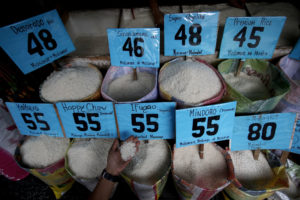A consortium formed by seven of the country’s biggest conglomerates insisted on Wednesday that it was not seeking any government guarantees, the existence of which could jeopardize its offer to modernize and operate Manila’s Ninoy Aquino International Airport (Naia) for 15 years.
Naia Consortium’s statement on Wednesday was in reaction to last week’s Senate inquiry on the recent Xiamen Air incident, during which its proposal for terminal fees was tagged as a potential guarantee. However, it was not explained how it was considered as such.
The Duterte administration has adopted a policy that barred any state subsidies or guarantees for unsolicited offers, which include the one proposed by Naia Consortium. The current issue raises questions on what should be considered as a guarantee.
Jose Reverente, spokesperson for Naia Consortium, said in the statement that government guarantees were those that protect proponents from risks and ensure a return even if the project fails.
“The consortium is not asking for such protection and guarantee and is taking all the risks, including a drop in the number of passengers and consequently revenues,” he said.
The issue came to light when Sen. Ralph Recto sought details on Naia Consortium’s P102-billion offer to improve and operate Naia as well as augment its capacity, currently well above its design specifications.
Transportation Undersecretary Reuben Reinoso, responding to those queries, said the proposal included a passenger service charge adjustment, another term for the terminal fee, throughout the concession period. He later agreed with Sen. Recto’s assertion that the provision could be “deemed a government guarantee.”
Reinoso told the Inquirer that the terminal fee structure was still a proposal and that negotiations between the government and Naia Consortium had yet to commence. He also promised that as a result of these negotiations, there would be “no direct government guarantee as required by law.”
Under the revised implementing rules of the Build Operate Transfer Law, a direct government guarantee refers to cases where the government will need to assume the obligations of the project proponent in case it defaults on its loans.
Reverente noted in the statement that adjustable terminal fees were standard features in airport contracts.
Naia Consortium’s proposal would still need the approval of the National Economic and Development Authority board after the DOTr announced that it awarded Naia Consortium an original proponent status earlier this month.
Under its proposal, Naia Consortium wants to increase capacity in Naia to 65 million passengers annually in four years. This is double the existing capacity of 31 million passengers. Naia’s four passenger terminals served 42 million passengers in 2017.
It also plans to increase the number of flights Naia can accommodate while building a “people mover” to conveniently link Naia’s terminals.
Naia Consortium’s members are Ayala Corp., Aboitiz Equity Ventures, Alliance Global Group Inc., Asia Emerging Dragon, Filinvest Development Corp., JG Summit Holdings Inc. and Metro Pacific Investments Corp. Its technical partner is Changi Airports International.


